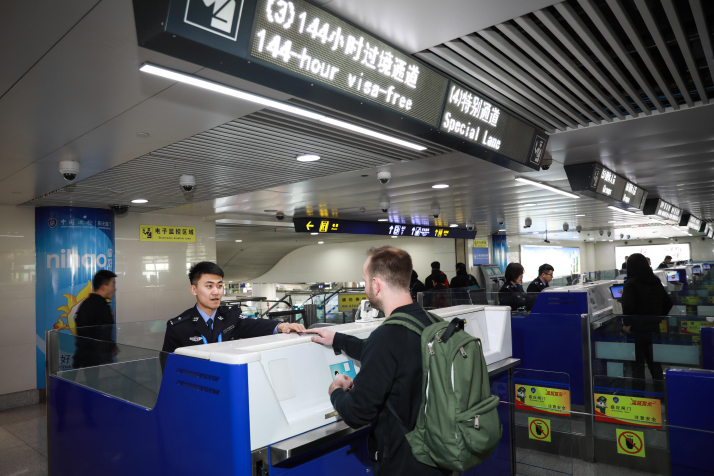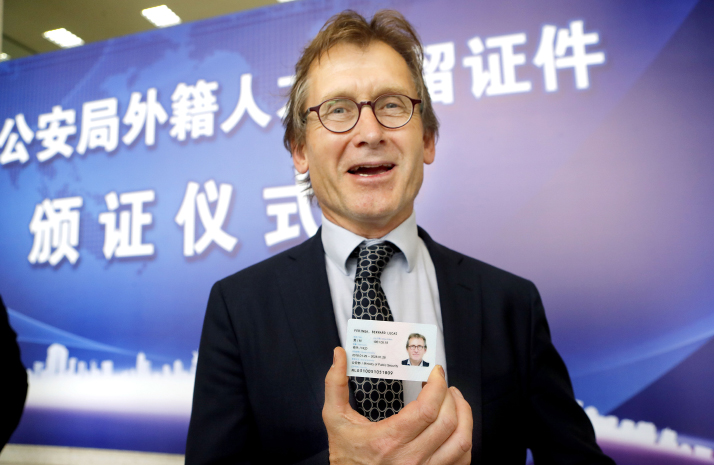|
||||||
|
||||||
| Home Nation World Business Opinion Lifestyle China Focus ChinAfrica Video Multimedia Columnists Documents Special Reports |
|
||||||
|
||||||
| Home Nation World Business Opinion Lifestyle China Focus ChinAfrica Video Multimedia Columnists Documents Special Reports |
| Nation |
| Easing the Way |
| Authorities gear up to streamline the visa and permanent residence application process for foreigners |
| By Yuan Yuan · 2019-08-12 · Source: NO. 33 AUGUST 15, 2019 |
 An international passenger goes through border control at an airport in Qingdao, east China's Shandong Province, on January 1, the day when the city started a 144-hour visa-free transit policy for foreign passport holders (XINHUA)
Muddassar Sharif, a Pakistani living in Shanghai, is an ardent entrepreneur. He started nine businesses during his four-year undergraduate studies at New York University Shanghai. After some failures and many lessons learnt, he finally established an artificial intelligence (AI) company that seems to be on the right track. After graduating in May, Sharif decided to stay in Shanghai for further business development. Along with the extremely promising AI market in China, another important incentive that prompted his decision was the entrepreneur visa that Shanghai introduced last year for foreigners who launch startups in the city. This visa measure is not new in China and has been adopted in quite a few cities including Shenyang, capital city of the northeastern province of Liaoning, and Nanjing, capital city of Jiangsu Province in the east. What is new are 12 measures announced by the National Immigration Administration (NIA) on July 17, to ease restrictions on visa and permanent residence applications nationwide, which cover groups of foreign experts, scholars, students and entrepreneurs. They went into effect on August 1. Easier and more convenient In the past, it was not easy for foreigners without work experience or a Chinese work permit to get a regular visa for working in China, and even a work visa was valid for only one or two years at most. According to the new measures, foreign graduates from China's prestigious higher learning institutions who start businesses in the country can get an entrepreneur visa valid for multiple entries for two to five years. In addition, foreign graduates from world-renowned universities in other countries who come to China to start businesses within two years after graduation can apply for a visa for less than two years. Foreign students who are invited to do internships in China by noted enterprises or institutions can also apply for a one-year visa. Meanwhile, the permanent residence application process was streamlined for more high-caliber foreign professionals, including holders of doctoral degrees and those who have made significant contributions to the country. Foreign spouses and children of qualified foreigners can also join the application simultaneously, according to the Ministry of Public Security (MPS). Jia Tongbin, a senior official with the NIA, said the policy package is aimed at drawing management and technology specialists from overseas who are in urgent need in China. "The policies are expected to encourage foreigners who work in China to make the most of their talent and attract more outstanding foreign youth to China," Jia said. Constant reforms China launched the permanent residence program for foreigners in 2004. Joan Hinton, a nuclear physicist and one of the few women who worked on the U.S. Manhattan Project to develop an atomic bomb, was the first foreigner to receive China's permanent residence permit (green card). She moved to China in 1948 and lived there for over 50 years, dedicating herself to the improvement of agricultural machinery and the dairy industry. In 2010, she died in Beijing. But by 2007, only about 10,000 foreigners had been granted residency due to its stringent requirements. The applicants either had to have made significant contributions to China; held high-level positions in government departments or laboratories involved in key national projects for at least four years; or invested at least $500,000 in west China or poor regions, $1 million in central China or $2 million in other areas for at least three consecutive years. These requirements made obtaining China's green card one of the most difficult procedures in the world. So far, holders of the Chinese green card include Bernard Lucas Feringa, winner of the 2016 Nobel Prize in Chemistry; Kurt Wüthrich, winner of the Nobel Prize in Chemistry in 2002; and Robert A. Mundell, laureate of the Nobel Memorial Prize in Economic Sciences in 1999. In 2016, Stephon Marbury, the former U.S. National Basketball Association All-Star, became the first foreign basketball player to obtain Chinese residency. As China steps up efforts to bridge the talent gap, its permanent residence policy has been loosened. China has issued 133,000 visas and residence permits to foreign entrepreneurs, investors, and technical and management specialists over the past few years, according to Chen Bin, an NIA official, at the press conference. Zhang Guojun, a partner at PricewaterhouseCoopers and a member of the National Committee of the Chinese People's Political Consultative Conference, China's top political advisory body, proposed lowering the threshold for China's green card in March. "We should vastly increase the number of permanent resident permits issued to foreign professionals and attract more of these people to come and work in China," he said. "They are in need not only in developed areas and hi-tech industries, but also in underdeveloped areas." Related services to facilitate their work and life in China should also be provided along with enhancing their sense of belonging, he added.  Bernard Lucas Feringa, winner of the 2016 Nobel Prize in Chemistry, receives his Chinese permanent resident permit in Shanghai on May 2, 2018 (XINHUA)
More choices Chinese Premier Li Keqiang said in September 2017 that as the world's largest developing country, China is at a critical stage of economic restructuring and upgrading. "We should not only make use of Chinese talent resources and market space, but also adopt a more open policy for foreign experts," he said. On April 2, 2018, the NIA was established under the MPS as a duty-specific institution to handle residence permit applications to make foreigners feel more welcomed in the country. Since then, the Chinese Government has optimized the application procedures for foreigners by accelerating the approval of qualified applicants. The NIA approved 1,881 permanent residence applications in two months after its inauguration, equivalent to the total number in 2017. Subsequently, some cities have taken similar measures to facilitate the process for foreign professionals to receive visas. According to a report by Xinhua News Agency, Shenyang has set up more than 50 service centers or stations to provide services for foreign business people, students and residents. By May, there had been 83 foreign students who had gotten an entrepreneur visa in the city. At a press conference held on July 1, the MPS said China is considering setting up immigration affairs service centers or stations in areas with a large population of foreigners to make their work, study and life more convenient. Copyedited by Rebeca Toledo Comments to yuanyuan@bjreview.com |
About Us | Contact Us | Advertise with Us | Subscribe
|
||
| Copyright Beijing Review All rights reserved 京ICP备08005356号 京公网安备110102005860号 |